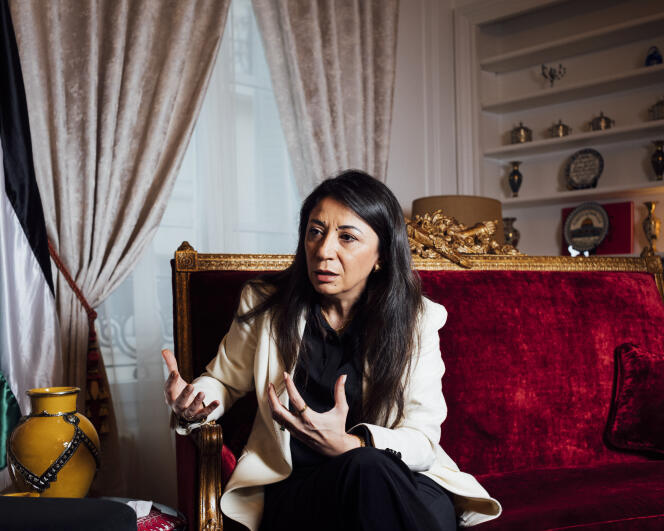


"Every time there's news of a bombing, I scan the names of the martyrs. I'm always afraid that my surname will appear on the list of victims. I try to find out where the bombing took place. Next to our building? Far away? Which street was hit, which family? I never thought I'd experience times like this." Hala Abou Hassira is the ambassador of a territory in tatters and her pulverized home city of Gaza.
On November 5, Palestine's head diplomat in France, who has been in office for two years after serving in Belgium and Canada, described the unspeakable on social media platform X: "Thirty of my cousins, their children and grandchildren have just been buried. Twenty-eight are still under the rubble."
Contacted by Le Monde, 47-year-old Abou Hassira recounted the hours she has spent since, her hand clutching her telephone in vain. She is at the mercy of telecommunications networks in the Palestinian territory, which get completely cut off and then only partially restored: "I call Gaza 20 times a day, or more. Sometimes it rings and nobody answers. It's a nightmare."
When we met her in her Paris residence on Saturday, November 18, the exhausted representative of the Palestinian Authority kept her eyes fixed on the Al-Jazeera channel, where images of hundreds of civilians fleeing the scene, waving white flags, and of the wreckage of buildings destroyed by the bombings were shown over and over again. She described the death of her relatives: three generations wiped out by one strike. "An older cousin, his children, their wives, his grandchildren and neighbors: 60 people were killed when the building was targeted. No one survived."
Huddled together in the same house by the sea, in the port district of Gaza City, a stone's throw from the Al-Shifa hospital, which was surrounded and then taken over by Israeli forces, the Abou Hassira family perished without having received prior warning of the shelling. Like many Gazan families, parents and their children had gathered there, some taking in others fleeing their neighborhoods and streets under fire. "The Israelis no longer give advance warning before bombing. At first, they did. Now they fire. Even if they know that there are 60, 100 people in the homes they're targeting," said the ambassador.
Abou Hassira rejected the Israeli army's claims that it targets Hamas leaders in its strikes, and cited the bombing of the Jabaliya refugee camp on November 1, which left a square of buildings in tatters and dozens dead and missing: "They said they were targeting Ibrahim Biari [a Hamas battalion commander]; the guy wasn't even there... There's no strategy behind this massacre, other than revenge. They want to destroy Hamas, but they're destroying the population, and civilian infrastructure."
You have 55% of this article left to read. The rest is for subscribers only.
